Geopolitics and the Emerging Investment Regime – Reflections on an ILW 2023 Panel
 By ABILA 2023 Student Ambassador Dr. Sylvie Bissaloue, George Washington University Law School, LLM ’23 and Attorney in Lyon, France.
By ABILA 2023 Student Ambassador Dr. Sylvie Bissaloue, George Washington University Law School, LLM ’23 and Attorney in Lyon, France.
This blog is part of a series of reflections on ILW 2023 by our Student Ambassadors. Each Student Ambassador engaged with a variety of panels and will be sharing their experiences over the spring and in the lead up to ILW 2024.
On September 15, 2022, President Biden issued an Executive Order with the Committee on Foreign Investment in the United States to curb “new and emerging threats and vulnerabilities in the context of foreign investment.” Further, on August 9, 2023, President Biden signed an additional Executive Order designed to address the threat of foreign investments and evolving technologies, by asking the Secretary of the Treasury and the Secretary of Commerce to issue regulations that “require United States persons to provide notification of information relative to certain transactions involving covered foreign persons (notifiable transactions) and that prohibit United States persons from engaging in certain other transactions involving covered foreign persons (prohibited transactions).” Concurrent with this Executive Order, the Secretary of the Treasury also issued an Advance Notice of Proposed Rulemaking (¨ANPRM¨) that sought public comments, including key terms to be included in regulations and the procedures that Treasury will establish to administer the new outbound investment program (the “Program”). Comments were due by September 28, 2023. Evidently, this administration believes new and evolving technologies and investment opportunities require a different regulatory regime with evolution built-in. This is the future of the financial security landscape for collective investment schemes.
On October 21, 2023, at International Law Weekend, Amy Porges, Principal at Porges Trade Law and member of the International Trade Law Committee of the American Branch of the International Law Association, moderated the panel discussion “Geopolitics and the Emerging Investment Regime.” Cross-border investment flows have long contributed to U.S. economic vitality. The panel discussed the novel and interesting regime implemented by the U.S. Treasury Department on outbound investment to protect national security. The speakers examined the challenges of this regime and the current state of play on outbound investment review, including its impact on capital flows between the United States, Europe and China. The panel included Joshua Gruenspecht, Partner at Wilson Sonsini Goodrich & Rosati; Zongyuan Zoe Liu, Maurice R. Greenberg Fellow for China Studies at the Council on Foreign Relations; Theodore ‘Ted’ R. Posner, Assistant General Counsel for the U.S. Department of the Treasury; and Anne Salladin, Partner at Hogan Lovells, who joined via Zoom.
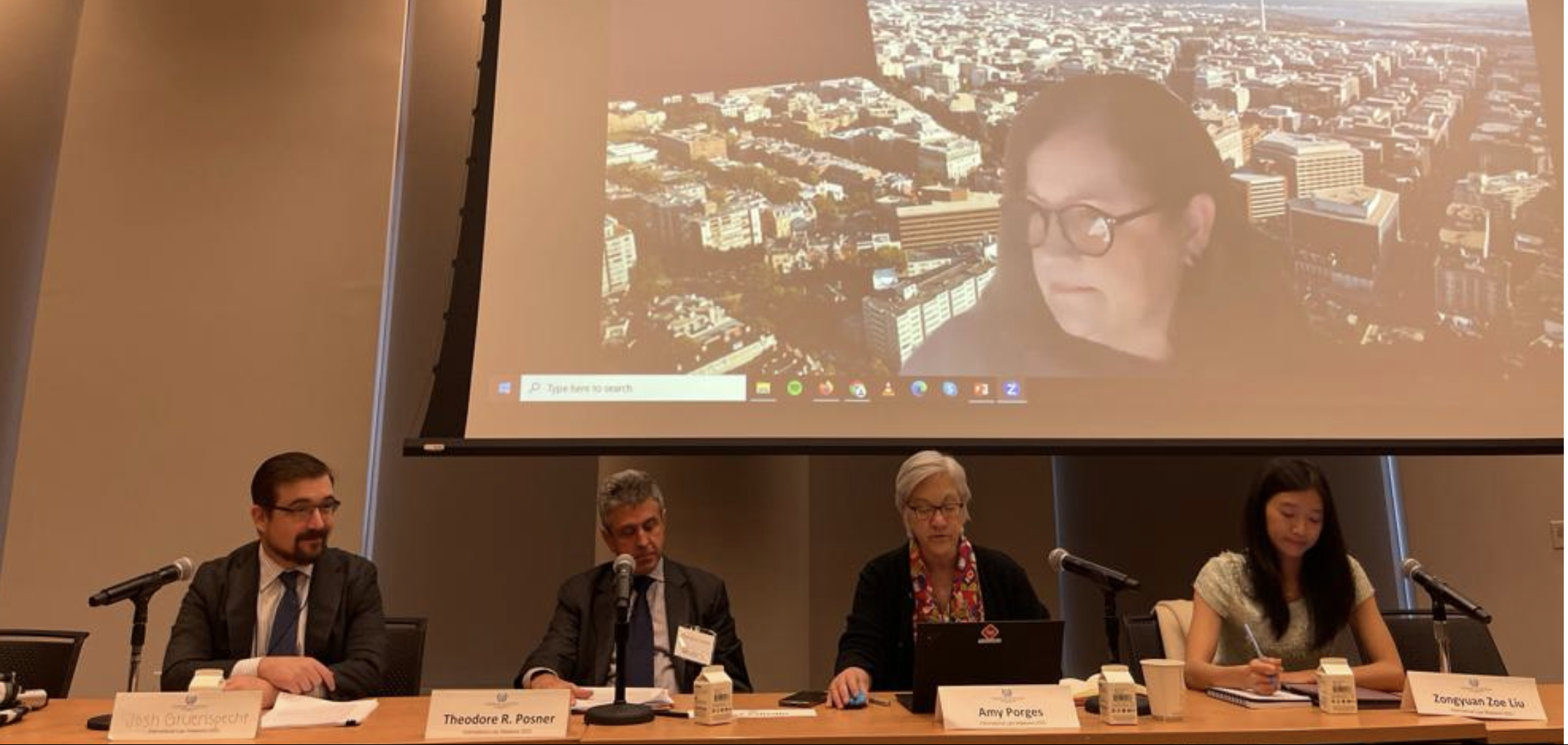
L-R: Joshua Gruenspecht, Theodore R. Posner, Amy Porges, Zongyuan Zoe Liu. Anne Salladin on Zoom.
Amy Porges opened the discussion by asking Theodore Posner the rationale for this new regulation. Mr. Posner began by contextualizing the new foreign investment regime. As he explained, the August 2023 launch was the result of “many months, and indeed years, of debate within the administration, between the administration and Congress, and with stakeholders on how to deal with this very specific issue.” This project is not a system for reviewing investments entering the U.S., determining their potential impact on national security. Instead, it is an attempt to address what is increasingly a problem between international economic transactions and national security. Over the years, the United States has developed a number of tools to deal with the national security implications of cross-border transactions. This includes export control tools to address concerns regarding what will happen if a particular good, technology, or software is exported and used in a way that jeopardizes national security; the Committee on Food Security (CFS) to deal with the treat to national security; or the government’s ability to restrict imports when said import could impair national security.
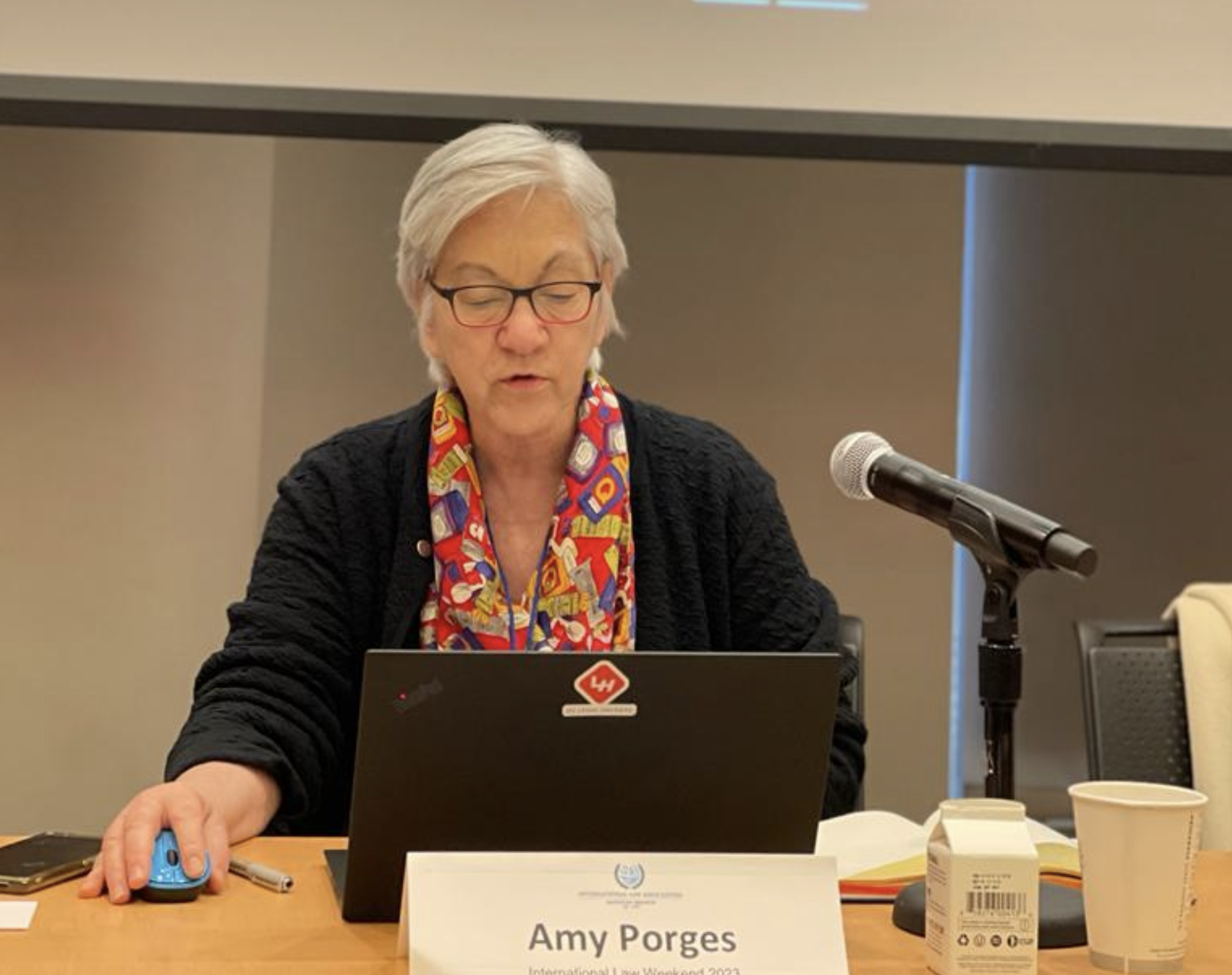
Amy Porges
So, what precisely is the Executive Order on Foreign Investment? It is an executive order prohibiting certain investments in entities that engage in specific activities related to some technology areas that pose the most acute national security risks, and require notification for other sensitive investments. In a press release dated August 9, 2023, the White House has explained the goals of The Program. According to the press release, “this program will seek to prevent foreign countries of concern from exploiting U.S. investment in this narrow set of technologies that are critical to support their development of military, intelligence, surveillance, and cyber-enabled capabilities that risk U.S. national security.” The Program therefore “complements the United States’ existing export control and inbound screening tools with a ‘small yard, high fence’ approach to address the national security threat posed by countries of concern advancing such sensitive technologies.” The regulation covers transactions in three specific areas: semiconductors and microelectronics, quantum information technology, and certain artificial intelligence technology. Certain transactions involving ‘US persons’ are concerned, including US-based companies and investors and other entities associated with such persons and companies. Allegedly, there are activities in countries of concern which may affect national security. The definition of “entity” is broad and includes, for example, corporations, joint ventures, and partnerships.
The Executive Order also empowers the Treasury Department to: (i) prohibit U.S. persons from “knowingly directing” transactions that would be prohibited if actually engaged in by a U.S. person; and (ii) require U.S. persons to “take all reasonable steps to prohibit and prevent” or report transactions by a foreign entity controlled by such U.S. person if said transactions would be subject to restrictions if engaged in by a U.S. person. In addition, these restrictions apply to any US individual serving on an investment committee, board of directors, or other governing body of a non-US fund or entity. This means that even if non-US funds or companies were to enter into a transaction in China that is outside of the requirements of The Program, an individual US citizen might nevertheless incur legal liability for the transaction. Although there is some debate about the extent of these activities and who is subject to the restrictions, the question is, can U.S. capital somehow exacerbate those risks, perhaps accelerate them, and give them a legitimacy that makes it easier for those activities to continue or to accelerate? Quite simply: yes. When U.S. investment flows into a country of concern to finance activities of concern, there is more to those activities than just the money invested in the transaction. There are other areas for concern, including the stamp of legitimacy, access to networks, and market access which, in some cases, could itself exacerbate the underlying risk to national security. Based upon this, the U.S. government decided to implement a program to curb these investments. This took the form of the August 9th Executive Order on Foreign Investment.
As one might expect, Mr. Posner defended the measure and insisted on why this new regime is necessary. For Mr. Posner, “national security is an evolving concept. It is important to adapt programs to changing needs.” To that end, the
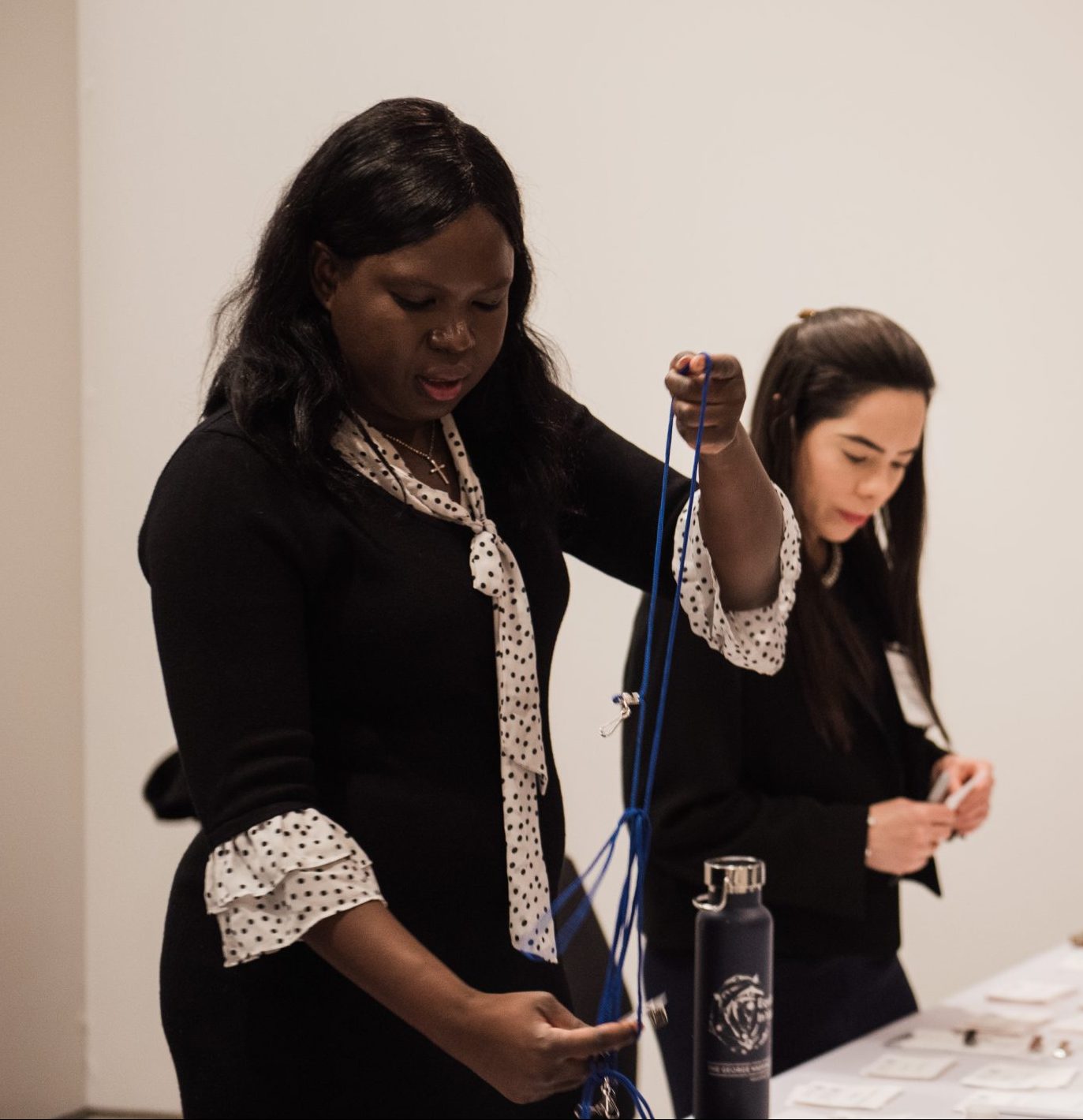
Student Ambassadors Sylvie and Ludmilla at ILW 2023.
President directed the Secretary of the Treasury to determine which of these ‘activities of concern’ should and should not be prohibited, and which should at least trigger a notification to the Treasury Department to provide more visibility into the nature of the investment and the relationship between the investment and the activity of concern. The Executive Order is based on the International Emergency Economic Powers Act. The new mechanism controls or prohibits U.S. foreign investment in semiconductors and microelectronics, artificial intelligence technologies, and quantum computing technologies in countries of concern. These controls present novel challenges: creating a new reporting and monitoring mechanism for outbound capital flows, defining its scope, coordinating with allies, establishing the mechanism’s legal and institutional basis, and other complex issues.
There are additional powers associated: for example, if a party has engaged in a prohibited transaction, the Secretary is authorized to ask the U.S. person to invest to compel or disassociate itself from that prohibited activity. He also has the power to investigate and issue subpoenas. The new regime does not restrict U.S. activity. It focuses directly on the activity of the US person on the assumption that if we regulate the activity of the US person, you indirectly control how he interacts with foreign investors. Part of the goal is to achieve visibility and transparency. To date, the Secretary has received 65 comments and expects these comments to raise issues that the government had not anticipated, as this regulation is the first of its kind.
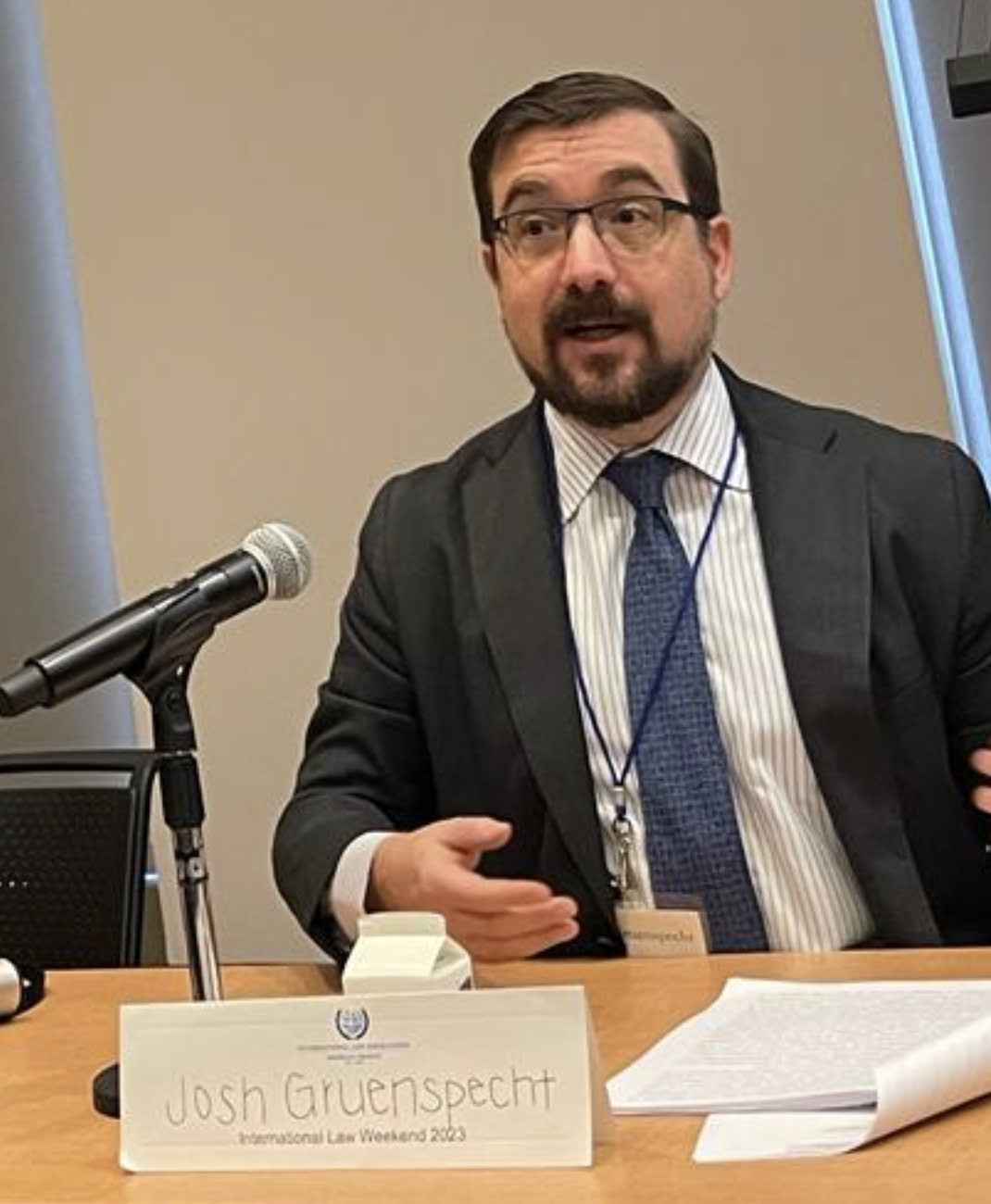
Josh Gruenspecht
Josh Gruenspecht took a more cautious approach. He stated, “the Treasury should be appropriately cautious in implementing any rule restricting foreign investment to ensure that it is narrowly tailored.” There are many questions the government should consider before moving forward with this regime, as the scope of this regulation is still a work in progress. How may U.S. law reach a transaction made overseas? How will we be alerted to these transactions? What is the scope of this cover transaction? Extraterritorial transactions can be very difficult to trace and building a complicated transaction is a norm in international law. It is arduous for the U.S. to decipher and concretely state who is the ultimate owner or investor, even though investors will have to cooperate to avoid sanctions. Gruenspecht believes that the new regime will evolve in only one direction: becoming more complex and restrictive over time. And even if the regulator narrows the scope, it will still have to decide which companies to apply it to.
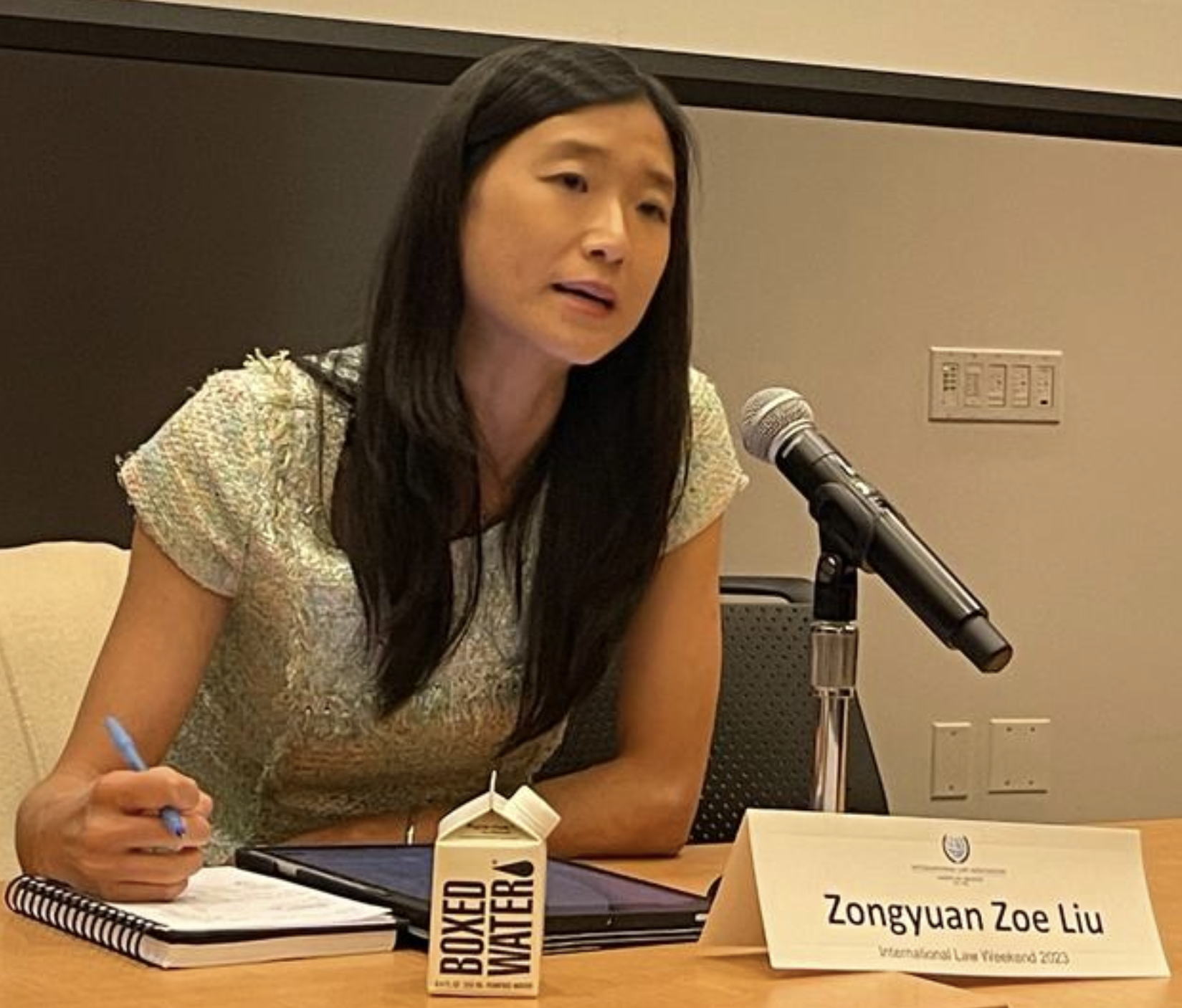
Zongyuan Zoe Liu
In a similar vein, Zongyuan Zoe Liu pointed out that “emerging outbound investment screening regimes have unintended consequences: among them may include increased cyber-based industrial espionage and the harm[ing of] U.S. interests.” President Biden issued this long-awaited executive order to prohibit certain U.S. outbound investment in China (including Hong Kong and Macau) in several technology sectors relevant to military, intelligence, surveillance, or cyber-enabled capabilities. The new regulation targets intentional Chinese government surveilling activities, such as high-level industrial espionage, that may harm the U.S. government. Through this restriction, the U.S. government may eventually undermine many useful U.S. corporate tools. Zongyuan Zoe Liu insisted on the danger of this regulation. As she said, the exception makes the regime vague, and the question is how may we reconcile that? Does this mean U.S. investors may no longer invest in Chinese national security enterprises? What if a university lab is funded by a Chinese company related to national security, should this funding be permitted? Perhaps this multi-layered restriction is useful, but it will make it more difficult to both determine who the ultimate investors and owners are.
Finally, Anne Salladin began by noting that there is strong support for this regulation, but not much literature regarding how this will be implemented. One of her criticisms of the new regulation is that parties will not be able to decide whether their transaction falls into the categories of activities prohibited by the Executive Order or which will trigger a notification to the Treasury Department. Parties will have to perform their own due diligence to determine this, and that is easier to do for a U.S. company than for a Chinese company. Another point of concern for Salladin is that some people have expressed that they would like to see the legislative branch legislate on this issue rather than the executive branch. She suggested that we have a list of names of foreign companies that U.S. companies cannot do business with, rather than asking companies to investigate and find out on their own.
To conclude, the speakers pointed out many inconsistencies in the new rule that may be problematic later in the enforcement of the executive order. If we agree that there is an intangible benefit to this regime, we should still ask whether all of the immense effort required for this regime comparatively provides enough national security benefit. They acknowledged that due diligence must be done and, because companies are risk averse, they will do everything to minimize risk. It is anticipated there will be a reaction from companies who voluntarily refrain from certain conduct but ultimately become targets because of this precaution. Further, capital is fungible and if you restrict US investment in China, it will be replaced by European investors. Lastly, it is important to distinguish between what categories of activities are prohibited and what may trigger the risk. The panel concluded that it is not appropriate to make a list of companies that should not be invested in, because this is not a sanctions regime.



